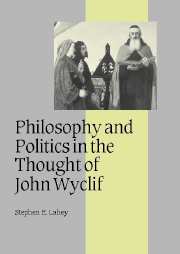Book contents
- Frontmatter
- Contents
- Acknowledgements
- Abbreviations
- 1 The historiography of Wyclif's dominium thought
- 2 Why dominium?
- 3 Wyclif's realism and divine dominium
- 4 Proprietas in Wyclif's theory of dominium
- 5 Iurisdictio in civil dominium
- 6 On kingship
- 7 Conclusion
- Bibliography
- Index
- Cambridge Studies in Medieval Life and Thought Fourth series
3 - Wyclif's realism and divine dominium
Published online by Cambridge University Press: 30 July 2009
- Frontmatter
- Contents
- Acknowledgements
- Abbreviations
- 1 The historiography of Wyclif's dominium thought
- 2 Why dominium?
- 3 Wyclif's realism and divine dominium
- 4 Proprietas in Wyclif's theory of dominium
- 5 Iurisdictio in civil dominium
- 6 On kingship
- 7 Conclusion
- Bibliography
- Index
- Cambridge Studies in Medieval Life and Thought Fourth series
Summary
Wyclif's most definitive treatment of dominium is in the second treatise of the Summa Theologie, De Dominio Divino, with a general definition of the term in the first book, and a list of the actions associated with dominium-relations in the third. Wyclif describes relation as a foundation for many of his theological and philosophical innovations. This is because Wyclif believes that God's absolute transcendence entails no real relation is possible between God and Creation. Only a relation following from some act of God in Creation can make the connection. And since God's dominium follows necessarily and immediately from the act of creating, dominium best defines God's continued participation in Creation. Wyclif defines divine dominium as “the standard prior to and the presupposition of all other dominium; if a creature has dominium over anything God already has dominium over it, so any created dominium follows upon divine dominium.”
Wyclif was a metaphysical realist about universals, and to those sensitive to late fourteenth-century Oxford philosophical dialogue, this description suggests a universal–particular relation holding between divine and human dominium-relations. If we are to understand Wyclif's thought on dominium as a theme uniting his earlier and his later writings and as a concept central to his philosophy, we will need to explore his thought on universals to see if divine dominium functions as one. Accordingly, we should survey Wyclif's realism, particularly as it appears in the Tractatus de Universalibus, to show how divine dominium is a universal by causality for all human dominium-relations.
- Type
- Chapter
- Information
- Philosophy and Politics in the Thought of John Wyclif , pp. 68 - 107Publisher: Cambridge University PressPrint publication year: 2003
- 1
- Cited by



